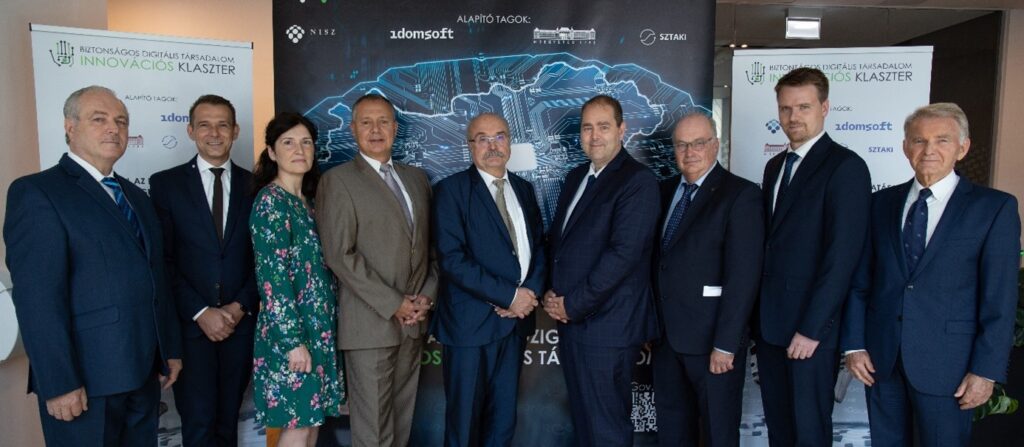Press release
New collaboration supports the secure digital developments of the government
Renowned professional and scientific organizations are collaborating to strengthen digital society in e-government, law enforcement and electronic public services. Firstly, these developments give citizens back the time they would spend on handling their matters and, secondly, they can do so more and more securely.
The inaugural meeting of the Secure Digital Society Innovation Cluster (BDTIK) took place on 27 July 2021. This officially launched the innovation projects planned in collaboration with the members of the Cluster, which aim at the development of e-government and e-public services, law enforcement tasks and the application of artificial intelligence for administrative purposes in order to serve the needs of citizens at an even higher level. Within the framework of the Cluster, leading public IT service providers and higher education and scientific institutions in the field coordinate their research and development activities in order to further support digital society with their innovations.
The Cluster operates within the framework of the National Laboratory of Infocommunications and Information Technology.
Mission of the Laboratory
On the initiative of the Ministry of Innovation and Technology, the National Office for Research, Development and Innovation started the establishment of National Laboratories in 2020. They act as a scientific base and knowledge centre for experimentation and innovation, especially in areas that are promising for the national economy. At the same time, they form an institutional arena for collaboration in the social, economic and environmental utilization of research results, also at international level.
One of the goals of the National Laboratory of Infocommunications and Information Technology is to contribute to the purposeful and conscious use of national data assets and to the establishment of the professional environment required for it. Government and administrative bodies are committed to the coordination of resources with cyber security, policing, law enforcement and e-government research and development.
Another key focus of the Laboratory is the development of competencies related to the research listed above. Achieving the goals is helped by research that increases service capability and efficiency.
Goal of the Cluster
The strategic goal of the Secure Digital Society Innovation Cluster, implemented within the framework of the National Laboratory, is to efficiently and innovatively promote the application of artificial intelligence in e-government. With this, it can effectively support the utilization of national data assets and the coordination of e-government research and development activities. The collaboration will involve leading public IT service providers, higher education and scientific institutions in the field, which set the goal of achieving results that can be well utilized as early as in the medium term.
The founding members of the Cluster are IdomSoft Informatikai Zrt., Nemzeti Infokommunikációs Szolgáltató Zrt., the ELKH Computer Science and Automation Research Institute, and the Budapest University of Technology and Economics.
The Cluster plans to use the results of research and development and innovation primarily for the performance of public tasks. Later, some of its results may also be utilized by the Hungarian State in accordance with its wider interests and for its benefit, in the international arena or in the market environment.
At the senior management event preceding the inaugural meeting of the Cluster, the attendees unanimously emphasized that professional collaboration that can connect the new technologies and challenges of the 21st century was created. This is an essential step in the innovative development of public tasks.
The membership of the Cluster is constantly expanding with new organizations, and all professional organizations will soon be involved in the developments. Citizens will soon find new innovative solutions when handling their matters.
Greetings in the spirit of collaboration (in order of speaking)
Dr Balázs Karlócai, CEO of IdomSoft Zrt., a company performing cluster management tasks, said in his brief welcome address that Cluster Members could complement each other well for the jointly set goal. The Research Centres (the University (BME) and SZTAKI) can make a meaningful contribution to the operation of the Cluster with their highly qualified researchers and the application of state-of-the-art technologies, while IdomSoft and NISZ can do so with their expertise and available infrastructure. In connection with future plans, he informed the attendees about other law enforcement and disaster management bodies joining the Cluster and international networking.
In his introduction, Károly Hajzer, Deputy Under Secretary of State for Information Technology of the Ministry of the Interior, emphasized that it was now necessary to concentrate on the production of specific products. He highlighted three main focuses of research, development and innovation: the use of artificial intelligence in the administrative and law enforcement fields, cyber protection and tasks related to national data assets. He emphasized that the available development funds did not support basic theoretical research, but prototypes and the creation of environments that could be used by society. Tests and prototype productions are already underway, and the supporting regulatory environment is in place. The ultimate task of the Cluster is to produce solutions like products that always serve citizens and serve the needs of citizens.
In his welcome address, retired Police Brigadier General Dr István Sabjanics, Head of the Department of Science Strategy and Coordination of the Ministry of the Interior, drew attention to the need to adapt to a constantly changing environment and to create an adaptive digital state. He pointed out that in the last 10 years, a number of scientific and professional conferences had been held in the field of digitization at the events of the Home Affairs Scientific Council. The goal is to create an environment where science, with its specific tools and methods, seeks answers and solutions to problems indicated by practical life. The guiding principle remains ‘scientia et securitas’: an environment in which science efficiently supports security. This is one of the most important missions of the Cluster.
Tibor Gulyás, Deputy Under Secretary of State for Innovation of the Ministry of Innovation and Technology, emphasized that the launched National Laboratories aimed to establish professional workshops in individual subject areas in Hungary in order to start developing competencies in Hungary which are able respond to significant global problems at international level. A key goal is to use the research results in society and the economy as a result of the work completed. He added that we could be successful if this work was carried out in collaboration with the actors concerned, for which launching the cluster was an excellent initiative, which would certainly open up new dimensions in the work through synergies.
Dr Péter Károly Risztics, Chairman of the Public Administration IT Centre of the Budapest University of Technology and Economics and of the Ministerial Scientific Board of the Ministry of the Interior, member of the National Communications and IT Council, pointed out that collaboration in the field between the Ministry of the Interior and the University had a long history and had achieved significant results in the field of administrative service development. At the same time, with the formation of the Cluster, new and specific perspectives open up in modern, data-driven public governance, which also utilizes the possibilities of artificial intelligence, and in the direction of expanding digital public services. This also places a serious responsibility on the organizations participating in the collaboration.
National Security Lieutenant General Dr Hedvig Szabó, Director General of the National Security Service, drew attention to the triple ensemble of innovation, public administration development and security. She said that the Cluster did not focus on basic research, but on results and products. In fact, it is about the state ‘recommending’ certain state-level problems to science for solution, which solves them in a way that can be utilized by society.
Iván Vetési, Chief Customer Relations and Services Officer of NISZ Nemzeti Infokommunikációs Szolgáltató Zrt., spoke about the practical aspects of using artificial intelligence research and applications. In his opinion, the task of the Cluster is to make the technologies of the future available to today’s services. NISZ Zrt. is committed to the use of new technologies, AI and robotics. A spectacular example of this can be mentioned: it is the MIA hybrid chat robot, which is a collaborative (hybrid) chat application already introduced in customer service.
Dr János Levendovszky, Deputy Rector of the Budapest University of Technology and Economics, assured the audience about the full availability of the university. As he put it, they were waiting for the problems proposed by public administration to respond to them with appropriate improvements. ‘Security is a social need and meeting that need is a social mission in which the Technical University is glad to participate. The task of the Cluster is to bring these developments to the level of even commercial products,’ said the professor.
Gábor Érdi-Krausz, Project Coordinator of the ELKH Computer Science and Automation Research Institute (SZTAKI) closed the series of addresses welcoming the establishment of the Cluster. In his address, he emphasized that the research on the agenda was not an end in itself and researchers took into account the specific utilization of the results and the technologies by industry. The long-standing organization with major professional achievements is ready to collaborate within the Cluster and to fulfil the tasks ahead.
Pictures (pictures will be issued in a size and format suitable for quality publication in the press; in their current form, they are for information purposes only)
Picture 1 (from left to right):
- Police Brigadier General Dr István Sabjanics (Department of Science Strategy and Coordination of the Ministry of the Interior)
- Tibor Gulyás, Deputy Under Secretary of State (Office of the Under Secretary of State for Innovation of the Ministry of Information and Technology)
- National Security Lieutenant General Dr Hedvig Szabó, Director General (National Security Service)
- Gábor Érdi-Krausz, Project Coordinator (ELKH Computer Science and Automation Research Institute)
- Károly Hajzer, Deputy Under Secretary of State (Office of the Under Secretary of State for Information Technology of the Ministry of the Interior)
- Iván Vetési, Chief Customer Relations and Services Officer (Nemzeti Infokommunikációs Szolgáltató Zrt.)
- János Levendovszky, Deputy Rector (Budapest University of Technology and Economics)
- Dr Balázs Karlócai, CEO (IdomSoft Zrt.)
- Dr Péter Károly Risztics, PhD (Chairman of the Public Administration IT Centre of the Budapest University of Technology and Economics and of the Ministerial Scientific Board of the Ministry of the Interior, member of the National Communications and IT Council)





